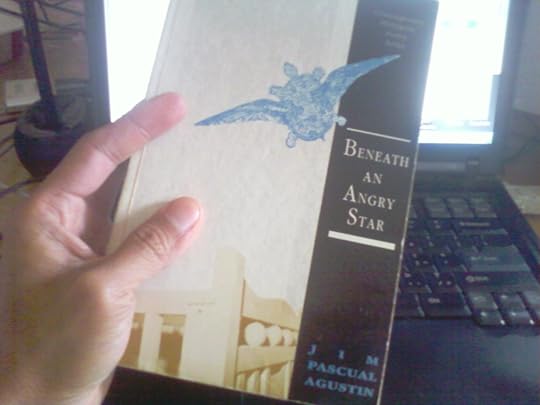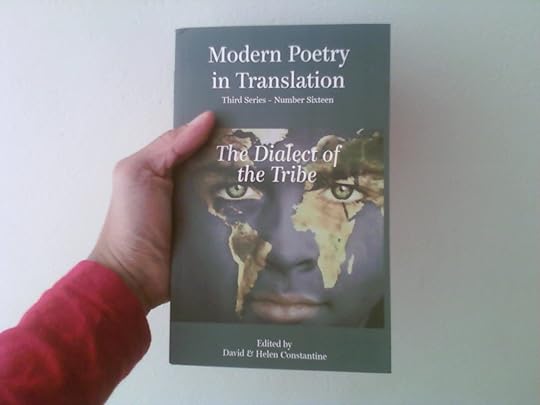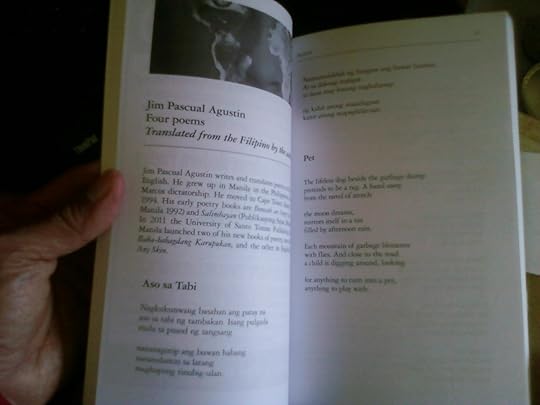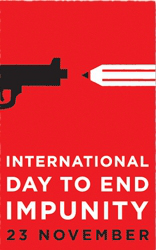Jim Pascual Agustin's Blog, page 47
January 3, 2012
"Operation Cast Lead" is not the Title of a Movie
"Operation Cast Lead" is not the Title of a Movie
After a night of gasping
at fireworks
I nurse the consequences
of champagne.
Somewhere else they are remembering
smoke that takes forever
to clear, the ringing in the ears,
the smell of burnt flesh
among personal belongings.
-o-
https://secure.wikimedia.org/wikipedia/en/wiki/Gaza_War
Filed under: Mga Tula / Poetry, Middle East, North America, poetry, politics, terrorism Tagged: Cast Lead, Gaza, human rights violations, terrorist state of Israel








"Operation: Cast Lead" is not the Title of a Movie
"Operation: Cast Lead" is not the Title of a Movie
After a night of gasping
at fireworks
I nurse the consequences
of champagne.
Somewhere else they are remembering
smoke that takes forever
to clear, the ringing in the ears,
the smell of burnt flesh
among personal belongings.
-o-
https://secure.wikimedia.org/wikipedia/en/wiki/Gaza_War
Filed under: Mga Tula / Poetry, Middle East, North America, poetry, politics, terrorism Tagged: Cast Lead, Gaza, human rights violations, terrorist state of Israel








December 31, 2011
A Good Year, A Bad Year
2011 is nearly over. Must be over by the time I post this – for those who live in certain parts of the world.
I can make a list a hundred kilometers long of 2011′s good and bad. But I won't. I have many things to thank for, and a lot of things I wish had never been.
I would like to thank this year for being the time my two books of poetry got published, a bridge to hopefully let others see my world a little.
Thank you to all the readers of this blog and my books' blogs. I hope 2012 will be better.
Filed under: Uncategorized








December 15, 2011
Notes for "Aso sa Tabi"
Not a lot of poetry written in Filipino has been translated to English or any other language. This has to do with the predominance of English as the medium of instruction in most schools and universities (or at least when I was still living in the Philippines), and as the official language in most spheres held by the elite. Translation has been limited to a handful of works so far, but hopefully this will soon change. With the continued interest in world literature and the ease of finding venues for publication via the internet, translation opens a crucial door for Filipino poetry.
"Aso sa Tabi" was originally written in 1991 and appeared in my first book, Beneath an Angry Star (Anvil Publishing, Manila 1992). I moved to Cape Town, South Africa in 1994 and have had less direct literary links with the Philippines since.
This translation was written with very good feedback from members of an online forum at Goodreads.com. Various versions were presented to the members – none of whom could read Filipino. The poem had to undergo many changes, including the title which would have literally been "Dog on the Side" (sounds like something from a menu!).
http://www.goodreads.com/topic/show/514500-dog-child-old-title-dog-on-the-side?format=html&page=2
Filed under: Uncategorized








December 7, 2011
"Pet" / "Aso sa Tabi" featured on Modern Poetry in Translation website
My poem, "Pet" (Filipino original "Aso sa Tabi") has been featured on the Modern Poetry in Translation website (UK). My copy of the issue arrived safely in the post recently and it looks amazing.
I translated four of my own poems and two from a good poet friend back home, Noel Romero del Prado.
CLICK HERE to get to the Modern Poetry in Translation website.
Filed under: Creatures, environment, Europe, Fragments and Moments, Literary News & Articles, Mga Tula / Poetry, poetry, Uncategorized Tagged: Aso sa Tabi, Jim Pascual Agustin, Modern Poetry in Translation, poetry, South Africa, translation








December 3, 2011
The Music is the Same, Just a Different Dance Floor
This is from William Blum's December 2011 post:
-o-
USrael and Iran
There's no letup, is there? The preparation of the American mind, the world mind, for the next gala performance of D&D — Death and Destruction. The Bunker Buster bombs are now 30,000 pounds each one, six times as heavy as the previous delightful model..
But the Masters of War still want to be loved; they need for you to believe them when they say they have no choice, that Iran is the latest threat to life as we know it, no time to waste.
The preparation of minds was just as fervent before the invasion of Iraq in March 2003. And when it turned out that Iraq did not have any kind of arsenal of weapons of mass destruction (WMD) … well, our power elite found other justifications for the invasion, and didn't look back. Some berated Iraq: "Why didn't they tell us that? Did they want us to bomb them?"
In actuality, before the US invasion high Iraqi officials had stated clearly on repeated occasions that they had no such weapons. In August 2002, Iraqi Deputy Prime Minister Tariq Aziz told American newscaster Dan Rather on CBS: "We do not possess any nuclear or biological or chemical weapons."1
In December, Aziz stated to Ted Koppel on ABC: "The fact is that we don't have weapons of mass destruction. We don't have chemical, biological, or nuclear weaponry."2
Hussein himself told Rather in February 2003: "These missiles have been destroyed. There are no missiles that are contrary to the prescription of the United Nations [as to range] in Iraq. They are no longer there."3
Moreover, Gen. Hussein Kamel, former head of Iraq's secret weapons program, and a son-in-law of Saddam Hussein, told the UN in 1995 that Iraq had destroyed its banned missiles and chemical and biological weapons soon after the Persian Gulf War of 1991.4
There are yet other examples of Iraqi officials telling the world that the WMD were non-existent.
And if there were still any uncertainty remaining, last year Hans Blix, former chief United Nations weapons inspector, who led a doomed hunt for WMD in Iraq, told a British inquiry into the 2003 invasion that those who were "100 percent certain there were weapons of mass destruction" in Iraq turned out to have "less than zero percent knowledge" of where the purported hidden caches might be. He testified that he had warned British Prime Minister Tony Blair in a February 2003 meeting — as well as US Secretary of State Condoleezza Rice in separate talks — that Hussein might have no weapons of mass destruction.5
Those of who you don't already have serious doubts about the American mainstream media's knowledge and understanding of US foreign policy, should consider this: Despite the two revelations on Dan Rather's CBS programs, and the other revelations noted above, in January 2008 we find CBS reporter Scott Pelley interviewing FBI agent George Piro, who had interviewed Saddam Hussein before he was executed:
PELLEY: And what did he tell you about how his weapons of mass destruction had been destroyed?
PIRO: He told me that most of the WMD had been destroyed by the U.N. inspectors in the '90s, and those that hadn't been destroyed by the inspectors were unilaterally destroyed by Iraq.
PELLEY: He had ordered them destroyed?
PIRO: Yes.
PELLEY: So why keep the secret? Why put your nation at risk? Why put your own life at risk to maintain this charade?6
The United States and Israel are preparing to attack Iran because of their alleged development of nuclear weapons, which Iran has denied on many occasions. Of the Iraqis who warned the United States that it was mistaken about the WMD — Saddam Hussein was executed, Tariq Aziz is awaiting execution. Which Iranian officials is USrael going to hang after their country is laid to waste?
Would it have mattered if the Bush administration had fully believed Iraq when it said it had no WMD? Probably not. There is ample evidence that Bush knew this to be the case, or at a minimum should have seriously suspected it; the same applies to Tony Blair. Saddam Hussein did not sufficiently appreciate just how psychopathic his two adversaries were. Bush was determined to vanquish Iraq, for the sake of Israel, for control of oil, and for expanding the empire with new bases, though in the end most of this didn't work out as the empire expected; for some odd reason, it seems that the Iraqi people resented being bombed, invaded, occupied, demolished, and tortured.
But if Iran is in fact building nuclear weapons, we have to ask: Is there some international law that says that the US, the UK, Russia, China, Israel, France, Pakistan, and India are entitled to nuclear weapons, but Iran is not? If the United States had known that the Japanese had deliverable atomic bombs, would Hiroshima and Nagasaki have been destroyed? Israeli military historian, Martin van Creveld, has written: "The world has witnessed how the United States attacked Iraq for, as it turned out, no reason at all. Had the Iranians not tried to build nuclear weapons, they would be crazy."7
It can not be repeated too often: The secret to understanding US foreign policy is that there is no secret. Principally, one must come to the realization that the United States strives to dominate the world. Once one understands that, much of the apparent confusion, contradiction, and ambiguity surrounding Washington's policies fades away. Examine a map: Iran sits directly between two of the United States' great obsessions — Iraq and Afghanistan … directly between two of the world's greatest oil regions — the Persian Gulf and Caspian Sea areas … it's part of the encirclement of the two leading potential threats to American world domination — Russia and China … Tehran will never be a client state or obedient poodle to Washington. How could any good, self-respecting Washington imperialist resist such a target? Bombs Away!
Filed under: Asia, Bush legacy, Capitalism's greed, Europe, Fragments and Moments, Imperialism, Influences, Middle East, North America, politics, terrorism, Uncategorized Tagged: human rights, imperialist powers, invasion, Iran, Iraq, Israel, madness, media lies, Oil reserves, propaganda, Saddam Husein, US foreign policy, war, western powers, WMD








November 22, 2011
END IMPUNITY
English translation attempt. Original Filipino follows – for those who are interested in seeing the random rhymes that got lost in translation.
November 23: No One Can Bury Shadows
remembering those slain in Maguindanao and other places
1
The door is a gaping mouth,
the afternoon's final gasp
before it goes dark.
Those footsteps
that left this morning
will never again
come knocking. In their place
news of violence
drags the weight
of darkness encroaching.
2
Is it a miracle, a blessing, or a ghastly
burden to escape
the piercing of bullets?
How heavy the echoes of silence
in pursuit of the last
drop of lead?
Pretending to be dead
in order to live.
3
What kind of joy
was set free
by those who pulled the trigger?
Whose voice unleashed
the dogs?
4
Dear President,
I presume you feel
loss such as this?
Your clan bears the stain
of those who usher darkness.
5
Tomorrow, as we turn
the day's paper,
new names will darken
the pages, our fingers.
-o-
Nobyembre 23: Walang Makapaglilibing sa mga Anino
paggunita sa mga pinaslang sa Maguindanao at iba pang bayan
1
Bukang bibig ang pintuan,
nasa bingit ang huling hininga
ng hapon bago dumilim.
Hindi na kailanman papalapit
ang mga hakbang na pumalayo
kaninang umaga. Sa halip
kaladkad ng marahas na balita
ang mabigat at papalaganap
na karimlan.
2
Himala, biyaya, o malagim
na pasanin kaya ang makaligtas
sa pagtagos ng mga bala?
Gaano kabigat ang alingawngaw ng katahimikan
kasunod ng pagbagsak sa lupa
ng huling tingga?
Pagkukunwaring bangkay
upang mabuhay.
3
Anong uri ng ligaya
ang pinalaya ng mga pumisil
sa gatilyo?
Kaninong tinig ang nagpakawala
sa mga aso?
4
Kagalang-galang na Pangulo,
inaasahan kong dama mo
ang mga ganitong pagyao.
Maging ang iyong angkan
may bahid
ng tagahatid ng karimlan.
5
Bukas, pagbuklat ng pahayagan
iba na namang mga pangalan
ang magpapadilim
sa mga pahina, sa ating mga daliri.
-o-
https://secure.wikimedia.org/wikipedi...
Please tell me if the translation works? Or if the poem itself works? The date has been declared International Day to End Impunity – after this massacre.
Filed under: Africa, Asia, Capitalism's greed, Europe, Fragments and Moments, Imperialism, Influences, Latin America, Life in a different world, Mga Tula / Poetry, Middle East, North America, politics, terrorism Tagged: International Day to End Impunity








November 16, 2011
Random and Not-so-Random
A few months ago I was invited to be part of a small group of writers from different parts of the world who freely share valuable critiques on each other's poetry online, in a private forum so our work could remain "unpublished." Discussions are very stimulating – not just about poetry or creative writing but pretty much anything under the sun.
Every week or so a prompt is posted and each member gets to write a poem out of it. The prompt could be a photograph or a series of photographs, a word, a piece of music, etc. I've managed to come up with new work from this exercise and have become rather addicted to this practice. Recently a new prompt was posted that I continue to struggle with. It's a beautiful photograph of a sunset against what looks to me as pine tree branches. Mostly red, yellow, orange and black.
Before this time I had told myself I would like to write something about the Maguindanao Massacre of 2009. I have tried to incorporate the photograph with the massacre, but so far nothing feels right. The other day I accidentally stumbled upon an old poem that needed to be revised. So for the meantime I dealt with that. Here is version 2.
Oh, before the poem… Hillary Clinton is visiting the Philippines to "strengthen ties." I think she means "shackles" or something worse. There's a mathematical explanation to the saying about keeping your friends and enemies – the distance and equivalent value. When I figure it out I'll share it with the rest of the world.
-o-
Random Thoughts on the Haditha Massacre on Valentine's Day
On Nov. 19, 2005, U.S. Marines allegedly killed 24 people in revenge for the death of one of their own, caused by an improvised exploding device (IED). The 24 individuals, six of whom were aged 10 and under, were shot at point blank range.
– United for Peace and Justice
Abdullah Walid, 4
Here is a photograph of a room, familiar
as an aunt's house. How can I like
the colour red now after seeing this?
Those bursts are not flowers
or abstract art. They are echoes
forcing me to hear doors being broken,
cries, pleas, gunfire, explosions.
The weight of boots
over silence. An eye
for each bullet hole.
I know your name and age
from scraps of stories handed down
by sources who never knew you.
Do I add one more violation
by imagining you surviving?
How your index finger might have felt
the fine edges of each bullet hole,
an odd sensation rising
between horror and laughter.
-o-
Abdul Hamid Hassan Ali, 76 – grandfather, father and husband,
who used a wheelchair, due to a leg amputation
following complications with diabetes. Died with nine rounds
in the chest and abdomen.
Khamisa Tuma Ali, 66 – wife of Abdul Hamid Hassan Ali.
Wisdom does not go
freely with age.
Yet we know there is something
worth hearing from somone
older than us. They have seen
more lives, more deaths perhaps
than our eyes can bear.
Here is one of them.
And another. Together.
They once spoke
in a language
unfamiliar to us.
They once spoke
to each other
as they held hands
at the end of another day.
Facing a new day
again in each other's arms.
For who knows how many years?
For who knows how many more years?
And then that suddden
unexpected
goodbye
void of an embrace.
-o-
http://en.wikipedia.org/wiki/Haditha_killings

Aftermath of US raid - photo from "The War Profiteers" taken from a video shot by Taher Thabet.
Filed under: Asia, Bush legacy, Capitalism's greed, Fragments and Moments, Imperialism, Influences, Literary News & Articles, Mga Tula / Poetry, Middle East, North America, poetry, politics, terrorism Tagged: children, civilians, Haditha, Haditha Masscre, Hillary Clinton, Iraq, Maguindanao Massacre, Philippines, President Bush legacy, US foreign policy, US Military atrocities








November 15, 2011
Gibson Guitar Plucks Tropical Trees
[image error]From RAINFOREST RESCUE:
Filed under: Africa, Asia, Capitalism's greed, Creatures, environment, Europe, Fragments and Moments, Imperialism, Influences Tagged: China, denudation, environmental destruction, environmental protection, Gibson guitars, trees, tropical trees, USA








November 9, 2011
A Question of Blood and Asphalt
There's a question that's been bothering me for a few years now. I've asked friends about it, and so far I've only gotten "Why?" and "Don't throw this question out there on the internet, people will think you're crazy."
A few years ago I saw a number of accidents on the highway on the way home. They were spaced about a week or so apart. Each time it was the car in front of me or just a few meters ahead that was involved. So I saw but barely heard the impact.
Years later I still know exactly where one particular accident took place, where the person was struck by a speeding car, where his body lay for a few minutes under the midday sun, the way his lips were moving but there was no sound.
My question goes sideways from this terrible series of accidents.
What chemical reaction takes place when blood spreads on asphalt and the noon day sun strikes at its harshest?
I've had this poem in draft mode for many years and I can never finish it.
-o-
To Be Haunted
version 2
The car in front
two seconds ahead of mine
struck him head on.
Two years since the day
the sun scorched his blood
onto the asphalt,
a trapped ghost.
It is still there, close to the island
on the highway, a dark shape
stretched on a darker surface.
Invisible to other drivers.
Now think of a calculated kill,
the intentional randomness
of bombs raining.
How many ghosts will there be
in cramped school halls, in homes
of huddled children? Fear and grief
systematically torched.
Beyond the chemistry of blood
reacting with asphalt
in the midday sun,
there is something I'd like explained.
-o-
Filed under: Creatures, environment, Europe, Fragments and Moments, Imperialism, Life in a different world, Mga Tula / Poetry, Middle East, poetry, politics, Silly Babble, terrorism















